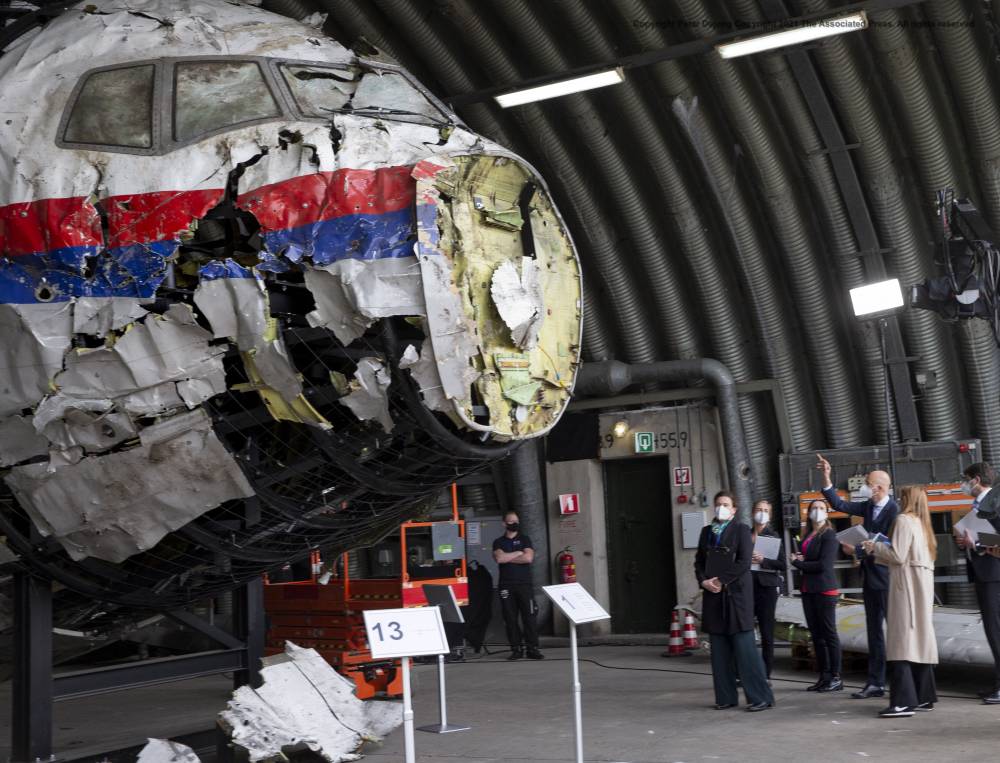MH17 disaster: 10-year quest for justice for the 298 dead
The crash came in the early stages of a war in which Moscow seized the Crimean Peninsula from Kyiv and stoked an insurgency by pro-Russian rebels in Ukraine's east.

PARIS - The world reacted with horror 10 years ago when Malaysia Airlines flight MH17 was shot down over war-torn eastern Ukraine as it flew from Amsterdam to Kuala Lumpur.
The crash came in the early stages of a war in which Moscow seized the Crimean Peninsula from Kyiv and stoked an insurgency by pro-Russian rebels in Ukraine's east.
- What happened? -
The doomed flight took off from Amsterdam on a bright summer's day on July 17, 2014.
Among the passengers were Dutch HIV/AIDS expert Joep Lange, on his way to a conference in Melbourne, and Jeroen and Nicole Wals and their four children, who were Malaysia-bound on a holiday.
At 4.19 pm (1319 GMT), while flying over eastern Ukraine's Donetsk region where pro-Russian separatist rebels were battling Ukraine forces, the plane exploded in mid-air, at an altitude of 33,000 feet (10.1 kilometres).
All 298 people on board were killed, 196 of them Dutch, as well as 43 Malaysians and 38 Australians.
A later reconstruction of the jet using some of the wreckage revealed the horror of the plane's last moments.
"The forward section of the aircraft was penetrated by hundreds of high-energy objects coming from the warhead," a Dutch-led international investigation heard.
"As a result of the impact and the subsequent blast, the three crew members in the cockpit were killed immediately and the aeroplane broke up in the air."
The investigators said some of the passengers may have known for up to 90 seconds that they were about to die.
- Who was held responsible? -
Russia and Ukraine immediately traded blame for the plane's downing.
The international probe in 2016 found "irrefutable evidence" that the plane was downed by a Russian-made BUK surface-to-air missile system which was transported from Russia to separatist-controlled eastern Ukraine.
Investigators later determined that the missile originated in a Russian military brigade based in the western city of Kursk.
Russia denied that any anti-aircraft missile crossed the border.
In June 2019, four senior figures in east Ukraine's self-styled rebel Donetsk People's Republic, Igor Girkin, Sergei Dubinsky and Oleg Pulatov of Russia and Leonid Kharchenko of Ukraine were charged with murder.
They were accused of bringing the missile system to the launch site in eastern Ukraine (but not of actually pressing the button).
The investigators said there were "strong indications" that Russian President Vladimir Putin approved the supply of the missile.
- Was anyone convicted? -
After a two-and-a-half-year trial a Dutch court in November 2022 convicted Girkin, Dubinsky and Kharchenko in absentia of murder and intentionally causing an aircraft to crash and sentenced them to life in prison.
The three refused to take part in the legal proceedings or acknowledge their roles in the incident.
Pulatov was acquitted.
Russia dismissed the court verdict as politically motivated.
In January 2024, Girkin was jailed for four years in Russia for repeatedly criticising the Kremlin for not pursuing a more aggressive offensive in Ukraine.
In 2023, the MH17 crash investigators suspended their work, saying there was not enough evidence to prosecute more suspects.
- Has justice been served? -
An investigation against Russia is still ongoing at the International Civil Aviation Organization, a UN agency.
The Netherlands and Ukraine have also jointly taken a case against Russia at the European Court of Human Rights in Strasbourg.
In the Netherlands, however, hope is fading that any of those responsible will ever be brought to justice.
"In the end, we were unable to put anyone behind bars," Dutch Prime Minister Dick Schoof told public broadcaster NOS on the eve of the tenth anniversary of the disaster.
"That sense of justice is there, but ultimately not as it should have been," he added. - AFP










